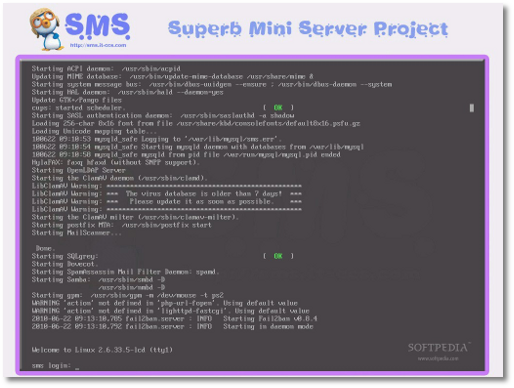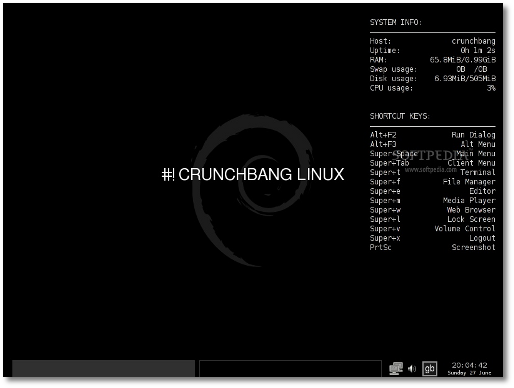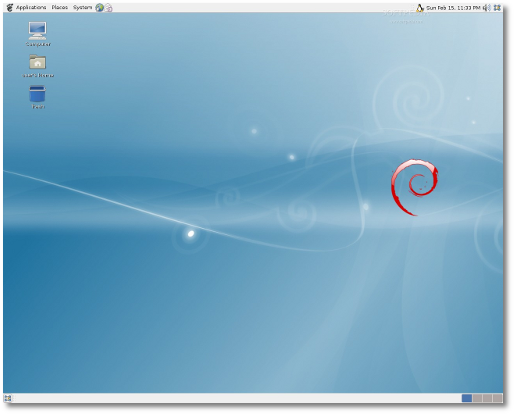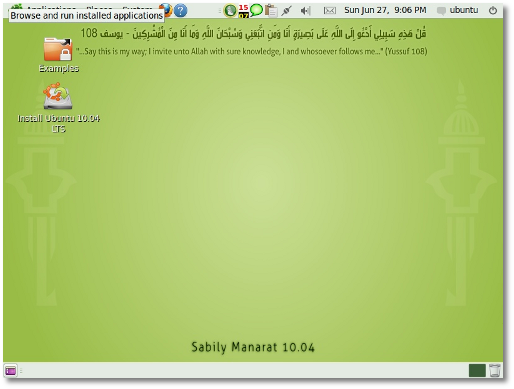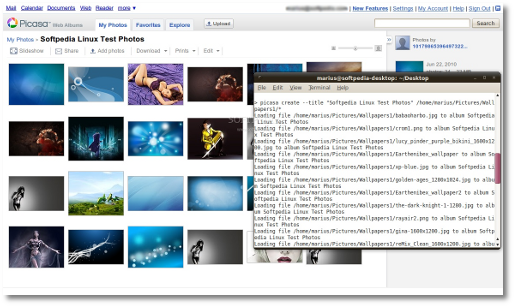Welcome to the 103rd issue of Softpedia Linux Weekly!
The following Linux-based operating systems were announced last week: Superb Mini Server 1.5.2, CrunchBang Linux 10 Alpha 2, Debian 5.0.5 and Sabily 10.04. In other news: VLC 1.1.0 brings amazing features; Nvidia relesease an improved video driver for Linux systems; Google releases Google Chrome 5.0.375.86 for Linux; Fedora 11 reaches EOL; Oracle releases VirtualBox 3.2.6; the KDE project releases the first release candidate of the upcoming KDE SC 4.5.0 environment. For this week we've also prepared a tutorial, about how to use the GoogleCL tool in Linux. The weekly ends with the video clip of the week, the latest Linux distributions released/updated and the development releases.
 Summary:
Summary:

 On June 21st, Superb Mini Server (SMS) 1.5.2 has been released. It’s a small update to the Slackware-based Linux distro aimed at small servers. It comes with an updated Linux kernel, as well as some updated packages. New ones include support for the Tcl scripting language and HFS (HTTL File Server) utilities. Superb Mini Server 1.5.2 also comes with a new visual package to complete the name change and rebranding. Superb Mini Server has now changed its name from SMS, which, in turn, was short for Slack Mini Server.
On June 21st, Superb Mini Server (SMS) 1.5.2 has been released. It’s a small update to the Slackware-based Linux distro aimed at small servers. It comes with an updated Linux kernel, as well as some updated packages. New ones include support for the Tcl scripting language and HFS (HTTL File Server) utilities. Superb Mini Server 1.5.2 also comes with a new visual package to complete the name change and rebranding. Superb Mini Server has now changed its name from SMS, which, in turn, was short for Slack Mini Server.
Highlights of Superb Mini Server 1.5.2:
· Linux kernel 2.6.33.5; · Dovecot-1.2.12; · Dovecot Sieve 1.2_0.1.17; · Cups 1.4.4; · MySQL 5.1.48; · slapt-get 0.10.2e; · Postfix 2.7.1; · Tk 8.5.8; · Tcl 8.5.8; · Hfsutils 3.2.6; · HPLIP 3.10.5; · NDISwrapper 1.56 - rebuilt; · IPtables_l7 - rebuilt; · Dahdi-linux - rebuilt; · Bootsplash kernels upgraded; · Openbravo 2.50MP18; · Postfix with vda patch added; · Optimize netatalk configuration; · Added lost curl-7.20.1 package in SMS64; · MetaMAIL 2.7.54 in SMS64.
Download Superb Mini Server 1.5.2 right now from Softpedia.

 On June 24th, Philip Newborough announced the immediate availability for testing of the CrunchBang Linux 10 Alpha 2 operating system. Dubbed Statler, the freshly cooked build is now based on the Debian Squeeze operating system and, in sync with its repositories.
On June 24th, Philip Newborough announced the immediate availability for testing of the CrunchBang Linux 10 Alpha 2 operating system. Dubbed Statler, the freshly cooked build is now based on the Debian Squeeze operating system and, in sync with its repositories.
Highlights of CrunchBang Linux 10 Alpha 2:
· Linux kernel 2.6.32.5; · Based on Debian Squeeze; · Fixed Bash completion; · Added Java support in Iceweasel; · Added Ubuntu-style notifications powered by notify-osd; · Improved support for Broadcom wireless cards; · Tweaked Debian installer (for a better installation experience). Also, an active network connection is not required for CrunchBang installations; · New themes based on the popular Shiki-Colors GTK2 style; · New icons created with the GNOME-Colors tool; · Added extra artwork and GTK+ engines; · Added Lua scripting support for Conky; · Added /sbin and /usr/sbin to the system $PATH variable; · Added hostname resolution support via Multicast DNS; · Added a new entry in the Openbox menu to easily install and setup the Dropbox service; · Added Adobe Flash Player 32-bit in the 64-bit edition of CrunchBang; · Added unified configuration files for both editions; · Added xcompmgr and Cairo Composite Manager in the Openbox edition; · Added post-installation script to easily setup printer support, install OpenOffice.org, LAMP stack and basic development utilities; · Fixed lockscreen issue for the Live CD.
Download CrunchBang Linux 10 Alpha 2 now from Softpedia. Remember that this is an alpha release and it should NOT be installed on production machines. It is intended to be used for testing purposes only.

 On June 26th, the Debian developers announced the immediate availability of the Debian 5.0.5 operating system. The updated release fixes several security and stability issues and comes with up-to-date packages. Notable changes are the removal of the Eclipse IDE packages from the repositories and newer Linux kernel versions.
On June 26th, the Debian developers announced the immediate availability of the Debian 5.0.5 operating system. The updated release fixes several security and stability issues and comes with up-to-date packages. Notable changes are the removal of the Eclipse IDE packages from the repositories and newer Linux kernel versions.
Debian 5.0.5 bundles the latest packages available in the ‘stable’ repositories and it's aimed at those doing a fresh install of the operating system. If you already have Debian installed, all the newer packages have been included in the online repositories and require just a regular update.
Download Debian 5.0.5 right now from Softpedia.

 On June 27th, the Sabily Linux team announced the immediate availability of the Sabily 10.04 operating system. Dubbed Manarat, Sabily 10.04 is based on Ubuntu 10.04 (Lucid Lynx) and it's aimed at the Muslim market. It bundles several Islamic software packages like Quran study tools and prayer time notifications. Sabily 10.04 comes with all the goodies in Ubuntu 10.04 and updated versions of its specific packages, like Zekr 0.7.6 and Thawab 3.
On June 27th, the Sabily Linux team announced the immediate availability of the Sabily 10.04 operating system. Dubbed Manarat, Sabily 10.04 is based on Ubuntu 10.04 (Lucid Lynx) and it's aimed at the Muslim market. It bundles several Islamic software packages like Quran study tools and prayer time notifications. Sabily 10.04 comes with all the goodies in Ubuntu 10.04 and updated versions of its specific packages, like Zekr 0.7.6 and Thawab 3.
Highlights of Sabily 10.04:
· Linux kernel 2.6.32; · GNOME 2.30.0; · Zekr 0.7.6 - Quran study tool for Linux; · Thawab 3 - encyclopedia; · New artwork and wallpapers for the “Manarat” release; · New offline recitation: Al-Muaiqly - encoded at 48kbps; · New parental web control application: Gnome Nanny; · New theme and window buttons on the left; · Built-in social networking tools providing integration with Twitter, identi.ca, Facebook, and other social networks with the MeMenu in the panel; · OpenOffice.org 3.2; · Firefox 3.6.3; · Simple Scan; · PiTiVi.
Download Sabily 10.04 right now from Softpedia.
· On June 22nd, the VideoLAN team announced one of best releases of the extremely popular VLC Media Player software. Dubbed "The Luggage," VLC 1.1.0 brings features that will put other similar applications on the back seat. Among some of the new features introduced by the VLC 1.1.0 player we can mention: GPU decoding using VAAPI for H.264, MPEG-2 and VC-1; DSP decoding using OpenMax IL; improved seeking for High-Definition (HD) MKV files; support for Blu-Ray PGS subtitles; support for HD-DVB subtitles; support for VP8, MPEG-4 lossless and Indeo5 video codecs; encoding and decoding of the WebM format, and more! Read more about it here.

· On June 22nd, after many months of hard work, Nvidia finally announced the final and stable version of the 256.x proprietary driver for Nvidia graphics cards. Nvidia 256.35 incorporates lots of fixes and improvements, over previous releases. Unofficial GLX support was also added for a few OpenGL extensions, as well as Thermal Settings reporting improvements, Compiz fixes, many VDPAU improvements, and many more. Read more about it here.

· On June 24th, just in time for the weekend break, the Google Chrome developers announced the stable release and availability for download of the Google Chrome 5.0.375.86 web browser for Linux, Windows and Macintosh platforms. This new version comes right after the beta release announced two days ago, which enabled by default the integrated flash player. Google Chrome 5.0.375.86 is available for both 32-bit and 64-bit architectures with binary packages for Ubuntu Linux. Read more about it here.

· On June 24th, Fedora 11 has officially reached its end of life, in terms of updates and support. The older version, which has been released almost a year ago to the date, will not be maintained from now on with a final call for patches having been already made. Users still running the aging release should think about upgrading to a newer version like Fedora 13, which has been released a month ago. Read more about it here.

· On June 25th, Oracle has released VirtualBox 3.2.6, a small, bug-fixing release but with a long list of changes, from improvements to the underlying virtualization technology to fixes for specific operating systems. The update comes after the release of VirtualBox 3.2.0 which introduced plenty of new features, and implemented several changes and support for newer hardware. Read more about it here.

· On June 27th, the KDE Project announced the release of KDE Software Compilation 4.5.0 RC1. This release is aimed at those wanting the cutting edge and who can live with some instability caused by the occasional bugs. Despite the early release candidate, KDE SC 4.5 is still slated for an August launch. Read more about it here.

 Tutorial of the Week of the Week: How to Use GoogleCL in Linux
Tutorial of the Week of the Week: How to Use GoogleCL in Linux
· Last week we've created a tutorial to show you a few real-life examples of how useful and simple the GoogleCL tool can be if you employ Google services on a daily basis. GoogleCL runs from the command-line (yes, the Linux terminal), and allows you to post, create, list or delete photos from an existing Picasa account, videos from a YouTube account, edit, list or upload documents from your Google Docs account, add, delete or list events from Google Calendar or post on your Blogger weblog. But these are just a few of the numerous functionalities of the new GoogleCL tool (see below for a complete list).
Read the complete tutorial here.

 Video Clip of the Week: Using GoogleCL (Google Command Line) to Update Calendar During Application Release
Video Clip of the Week: Using GoogleCL (Google Command Line) to Update Calendar During Application Release
· For this week we've posted a 720p HD video clip showing an automated release using Nolio ASAP and how Google calendar gets updated with release results. The video has 2 minutes and 28 seconds, and was posted by NolioSoft. Enjoy!
· Ubuntu Tutik Remix 10.04 · Zenwalk Openbox 6.4 · nFluxOS 10.04 Bible Edition Lucid Lynx
 Distributions Updated Last Week:
Distributions Updated Last Week:
· wattOS R2 · Clonezilla LiveCD 1.2.5-30 · Peppermint One 06172010 · GParted LiveCD 0.6.0-4 · Debian GNU/Linux 5.0.5 · SME Server 7.5.1
· Tiny Core Linux 3.0 Alpha 8 · BlankOn 6.0 RC · Dreamlinux 4.0 Beta 6 · Linux Mint KDE Edition 9 RC · Frugalware Linux 1.3 Pre 2
See you again next Monday, July 5th, for another issue of Softpedia Linux Weekly.
Follow me on Twitter @MariusNestor Follow us on Twitter @softpedialinux
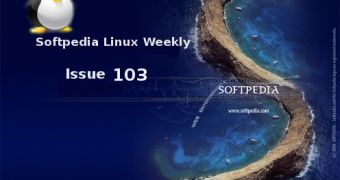
 14 DAY TRIAL //
14 DAY TRIAL // 